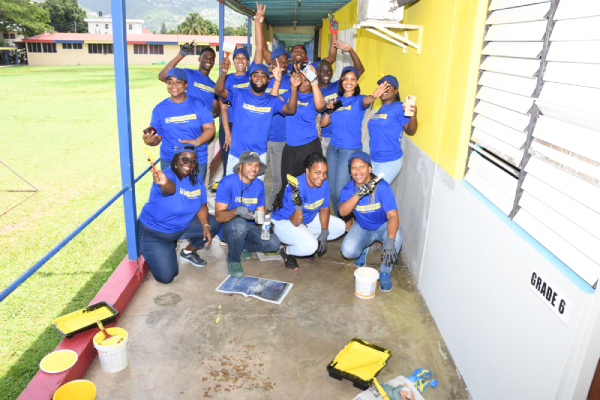
Breast Cancer Warrior: Giving Up was Never an Option
Breast cancer awareness tips often advise women and men to check for lumps, swelling, distortions or discharges from the breast. But, for 55-year-old Darcy Parkins, who was diagnosed with breast cancer in January 2017, there were no such signs.
“I did not feel a lump and nothing adverse showed up in my ultrasound or mammogram. There was no trace of any other cancerous indication in the breast. My only symptom was a persistent itching, which was accompanied by a rash on my nipples,” explained Mrs Parkins, who is one of five warriors who are telling their stories as part of the JN Bank’s Power of Pink campaign.
After complaining about the nagging itch for far too long, Mrs Parkins’ daughter, who was a medical student, advised her to visit a dermatologist.
“I was prescribed a topical cream for the itching and flaking, which helped a little bit; however, after a few weeks the symptoms were back. I returned to the dermatologist, who changed the cream, but the itching and flaking were persistent,” the mother of two recalled.
At this point, Mrs Parkins’ doctor decided to send her to do a mammogram and an ultrasound.
“I was reluctant, because I did a mammogram only about six months before and the results were normal. However, I went ahead and did the procedure and everything appeared to be fine,” she said.
Her doctor then recommended a biopsy.
“It took me awhile to get the courage to do the biopsy, because for one, I didn’t think it was necessary; and two, I really didn’t want them cutting a piece of my nipple,” she said.
“When the doctor told me the results, I was shocked, because I honestly wasn’t thinking cancer. I didn’t cry or breakdown. I just went numb and was in a daze for a while,” Mrs Parkins related.
At 54-years-old, Mrs Parkins was diagnosed with Paget’s disease of the areola and nipple – a rare form of breast cancer in which cancer cells collect in or around the nipple. The cancer usually affects the ducts adjacent to the nipple first, and then spreads to the nipple surface and the areola. The nipple and areola often become scaly, red, itchy, and irritated. Symptoms can be similar to eczema.
The disease accounts for less than 2 percent of all breast cancer cases, predominantly in women, but with rare cases in men.
Once she received the diagnosis, Mrs Parkins did not hesitate to seek treatment.
“I had a close friend who died from cancer the year before and, therefore, I had already told myself that, if I was ever diagnosed with the disease, I wouldn’t hesitate to do a mastectomy, if that was required to save to my life. Once I told my doctor this she sent me to see a surgeon right away,” she recalled.
In less than two weeks, Mrs Parkins underwent surgery to remove the affected breast. She later also underwent reconstructive surgery.
“Luckily, based on my age and lifestyle and the results of the tests which were conducted on the breast tissue that was removed during surgery, the doctors determined that I didn’t need to have chemotherapy or radiation treatment,” she informed.
For strength, she relies on her family, who are an ever present source of comfort and support. “My immediate and extended family and my church family are there with me every step of the way. My sisters and brothers, my daughter and son; as well as, my husband, everyone rallied around me,” she related.
“It certainly wasn’t easy, but everyone dealt with it in their own way. Some of my siblings really struggled to accept the diagnosis, because we had just lost both of our parents the year before, within a nine week span. My husband and son really took it hard,” she informed.
“However, my daughter, who is a young doctor, remained very strong. She has been right by my side, conducting research and doing everything she can to learn more about the disease and the various treatment options.”
Mrs Parkins decided to tell her story to assist other women who receive similar diagnosis to know that there is hope and that “cancer is not a death sentence.”
“I also want to encourage women to become in tune with their bodies. Don’t be afraid to check your breasts. Do your mammograms and discuss even the slightest of changes with your doctor,” she advised.
Additionally, Mrs Parkins advises families to be more open with each other and talk about the medical history of their family members.
“My grandmother died from breast cancer and it was after my diagnosis that my daughter and my nieces found out that their great grandmother had cancer. We just never spoke about it and more families need to be open with such information.”
She further encourages women to get a critical care plan. “There is no reason, no excuse not to have a good insurance plan. Don’t say you can’t afford it, make it a priority. If it wasn’t for my insurance plan I don’t know how I would have been able to pay for the surgery and other treatments,” she said.
For Mrs Parkins, being a “Pink Warrior,” means never giving up. “It means believing that despite the diagnosis, despite the disease and the struggles and pains you have what it takes to fight…to stay alive.”
Check out more stories like this

Pay Attention! Expert Calls Jamaicans to Heed Mental Wellness of Men and Boys
Mental health expert Dr Marlon Simpson is calling for urgent...

When Push Comes to Shove! Protect Yourself from MFA Fatigue Attacks
Multi-Factor Authentication (MFA) is one of the best ways to...

Salvation Army, Harvest Time and Cooreville Benefit from JN’s Labour Day Efforts
In observance of this year’s Labour Day, the JN Circle...